Data science already knows what illness we will have in 20 years’ time
_20240402102904_0.jpg)
How do online clothing shops improve the sizes they recommend to customers from data from previous purchases? What future illnesses can the statistics on hospital visits in recent years predict? At the conference, held at Corvinus, women professionals from a wide range of fields demonstrated the complex potential of data science. During the half-day scientific and networking event, mostly Hungarian specialists and a Viennese researcher spoke about the latest developments and challenges in their field of study.
The participants of the conference were welcomed by Réka Vas, Vice-Rector for Education, who highlighted in her speech that there are few fields more dynamically developing than data science: “the work of all professionals working in the field is currently a drop in the ocean, but when combined, they shape the future”.
According to Réka Vas, the great interest in the annual Women in Data Science conference also shows that the proportion of women specialists and researchers in this branch of science is happily becoming more and more pronounced.

Anna Emese Takács, Head of Data Science at BeHive Consulting, discussed the ethical issues related to customer data collected in the financial sector. In the digital world, almost every step we take leaves a mark. And companies are keen to use data collected about our shopping habits for marketing purposes. However, according to the expert, it is less well known that this data can have a significant impact on people’s creditworthiness and thus their chances of social mobility. With the rise of artificial intelligence, machines are increasingly performing the complex calculations that determine a customer’s creditworthiness. However, according to Anna Emese Takács, artificial intelligence is not yet a substitute for skilled data analysts who can decipher the human behavioural patterns behind transactions from the data. Their work can currently balance the ethical setbacks caused by rapid technological innovation, she says.
Then Emese Pogácsás, Vice President of Engineering, Secret Sauce Partners, spoke about a very tangible, practical topic. Through the online purchase of women’s bras, she demonstrated how customer feedback and transaction data can help webshop developers to offer more accurate product sizing.
Elma Hot Debric, a postdoctoral researcher at the Medical University of Vienna, uses Austrian health data to investigate the most common illnesses in each age group over the past decades. The researcher and her colleagues analysed data from 45,000 hospital visits from 1997 to 2014, from which typical patterns emerged. For example, if a male patient had sleep problems in his twenties and thirties, he was likely to have weight problems by his fifties.

The wide range of possible applications of data science methods is perhaps best illustrated by the research of sociologist Dorottya Kisfalusy, a researcher at the HUN-REN Social Science Research Centre. The expert used statistical models to investigate the effect of negative gossip among adolescents on the characterisation of human relationships. The results showed that the adolescents’ main goal was to gain consensus within the group by spreading negative rumours about their peers. The researcher found that young people with an extra high or extra low reputation within the group are the most likely to be the victims of negative gossip. Interestingly, there was no gender difference in the amount of gossiping, with boys and girls equally willing to participate.
The presentations were followed by a panel discussion on the opportunities and challenges in data developing data science careers. The discussion was moderated by Júlia Koltai, Researcher at the HUN-REN Social Science Research Centre and ELTE, and included Andrea Kő, Head of the Corvinus Institute for Data Analytics and Information Systems, Kriszta Kozma-Renge, Data Expert, Anna Széll, Product Development Expert, and Tímea Lestár, Head of People Analytics and Managing Director of Arm Hungary. The rest of the afternoon continued with informal networking.
Photo: Edit Madar